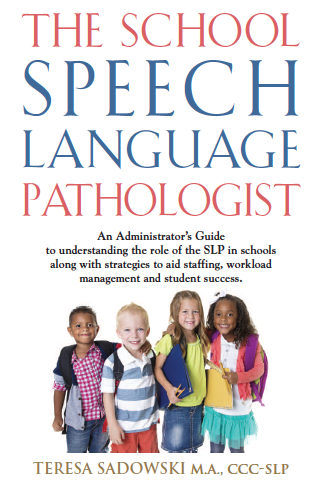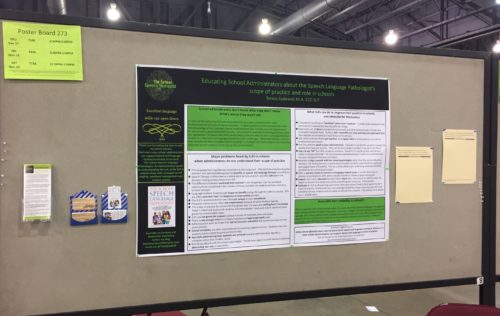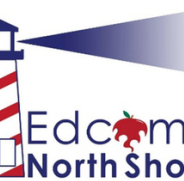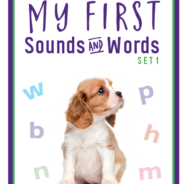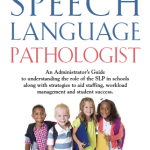My Book “The School SLP”
It’s here!!!
THE SCHOOL SPEECH LANGUAGE PATHOLOGIST is now for sale at all storefronts as an e-book for $4.99:
AMAZON:
http://www.amazon.com/dp/B00Y6YDAZI
BARNES & NOBLE:
http://www.barnesandnoble.com/w/the-school-speech-language-pathologist-teresa-sadowski/1121994087?ean=2940151592819&itm=1&usri=2940151592819
BOOKLOCKER:
http://booklocker.com/books/8038.html
ITUNES:
https://itunes.apple.com/us/book/school-speech-language-pathologist/id998181107
KOBO:
https://store.kobobooks.com/en-US/ebook/the-school-language-pathologist
ASHA 2016 Day 2
Well I logged in almost 20,000 steps on the fit bit today. Seemed like all the sessions I wanted to attend were at the other end of the complex. Started early with a session on helping students with narratives. That seems to be a big issue on my caseload these days but in not your typical way. Did get some good ideas to share. I also had my picture taken in the PR Lounge with advocate as my title.
The second session was titled Progress Monitoring and put on by the two ladies who created the product SLP Toolkit. Lisa Kathman and Sarah Bevier are two dynamic working SLPs who may have just come up with a program and practical material that could work for school SLPs. I stopped by their booth (739) yesterday and got a demo. If you follow my blog you know I’m pretty critical but I was duly impressed. Lots of time you look at material or programs that just don’t fit but I think the SLP Toolkit fits.
The mindfulness session I attended wasn’t what I thought it might be so I went on to another session focusing on spelling disabilities. I got some good information out of that.
Decided to put my feet up for an hour or so before setting up my poster and meeting friends for dinner. I’m excited to present my poster and share my concerns. I”ve created a rack card that you can give to your school administrator to help start the conversation. The rack cards will be there all day and I will be there from 12:30-2. Board 273
Finally got out of this building and walked to Little Nonnas with friends. A fun little hole in the wall on Locust street. We had an excellent meal. It was just such a cute place. Highly recommend.
One more day to go.
Teresa
Administrators guide to SLP Available at ASHA
Hi everyone. Just a quick reminder that I do have a few copies of my book with me at ASHA. I can let them go for $10. I have shared the book with a few vendors that might benefit. If there is anyone here at ASHA that you think should have a copy of my book please let me know.
Dont forget my poster session saturday 12:30-2. I have a rack card made up that you can share with your administrators to open the conversation
I am a leader
I’ve had quite a long day here at ASHA. I’m just about ready to fall asleep at the computer. Usually I don’t go in for the rah rah of welcome ceremonies but I am sure glad I went this morning. ASHA brought in a wonderful motivational speaker named Drew Dudley. He spoke about leadership and basically how we should all consider ourselves leaders. If you get a chance check him out on Ted talks but hopefully ASHA will put his talk on the ASHA website. Anyway it was a nice way to start my day.
I got two sessions in today. The first one was given by an Audiologist named Jeanane Ferre on CAPD. She did a very good job of explaining different aspects of CAPD and even provided goal and objective samples. It was an excellent presentation. The second one was encorporating music with patients with severe brain trauma. I remember learning (or realizing) the music connection to language development/recovery back in college. It is almost sinful that thirty years later it still isn’t standard practice or encorporated more often. Some of their patient videos were amazing.
So what else did I do all day? I attended a Sig 16 meeting (where I won a free affiliation membership for a year), listened to a variety of poster sessions, went to the PR Lounge reception (tomorrow I am going back to get my picture taken as part of their campagine to promote our CCCs), went through all the vendor booths and went to a very well attended SLP blogger meet and greet. My only dissapointment there is that it was too loud and crowded to meet and greet anyone. No one was really facilitating anything but they gave away a lot of prizes. I will try to stop by their booth tomorrow I think to make that connection.
Most important I got to meet up with an old friend, we had a nice little chat and planned dinner for tomorrow night.
I did pass out a couple of my books and a few of my cards so I’ll see if anything comes of that. All and all it was a fun and deucational day. I’m all planned for tomorrow and looking forward to getting up early and get moving. Looking forward to setting up my poster session at 6:00 tomorrow evening. Don’t forget to stop by my poster session I have a rack card for to give your administrator.
The only thing I’m going to do differently tomorrow is to eat a huge breakfast. I was starving by mid day:)
Teresa
Largest gathering of SLPs in history
Attending the Welcome to ASHA meeting. Going over some of the choices for programs. I’m going to be exposed to an amazing amount of information the next few days.
Over 1700 poster sessions over the next 3 days. That might explain why so many SLPs were traveling with tubes😉 Hope you all take some time to stop bye and peeks at the posters your interested in.
There were about 6 sessions I wanted to attend this morning. My plan is to attend one focusing on capd and writing ieps to reflect capd goals. I’ll let you know how it goes
Can you spot the SLP?
I made it to Philly. It was a lot of fun at the airport. Met several SLP’s as we waited for our flight from Boston. We played spot the SLP. Which is never hard….SLPs can always scope out other SLPs…we must have some sort of cosmic connection. It helped that every other SLP was carried a poster tube with them.
Signing in was painless. No lines yet. I can’t imagine what the lines will look like tomorrow. It looked a little like they were getting ready to move some livestock. The sign up is set up in the exibition hall. Tonight there were lots of people around to point you in the right direction. The gift bags were basically program books and advertisements. There was also one cool little sticker.
Went over to the first timers event. I figured I qualified since I hadn’t been here for 29 years. It was more of a welcome to the ASHA organization rather than welcome to the conference. ASHA offered a nice little spread but if you wern’t with someone it wasn’t really that engaging. So I bailed and went to the Marriott Rewards Lounge for a drink and some nibbles.
Plan for the rest of the night is to firm up my plan for tomorrow.
ASHA here I come
I’m very excited to be traveling to ASHA 2016 today. I’m all set to go except for a few last minute details. I’ve already asked my husband to make sure I don’t forget to take my poster with me. My biggest fear is that I’m going to leave the poster somewhere since I’m not use to carrying around a tube. No I’m pretty sure I’ll keep the poster pretty close to me the whole trip.
Of course I’m wondering if there will be any interest in my poster session. It’s basically about self advocacy and recent personal experience tell me this is something greatly needed in our field. It is something I’ve worked on for years without much buy in from colleagues who are just trying to get through their day. Most of my work with administrators has fallen on deaf ears and we need to change that.
I’m hoping to get to Philly with a couple of hours of daylight to spare so I can see the city a little bit. ASHA sent an email warning us about political protests going on and to be cautious. I’m really not concerned, I don’t think SLPs are threatening targets. My experience is that most of us are too busy to even bring the subject up.
Apparently attendance for ASHA 2016 will shatter previous records. 15,000 SLPs and Audiologists are defending upon the city. I am looking forward to meeting some very friendly, interesting and like minded therapists the next few days.
Looking forward to attending the first timers meeting this evening. I figured since it’s been 29 years since my last convention It might be a good thing to go. Unless something more fun comes up.
Oh one last thing. I will have a few copies of my book available if anyone is interested. $10 if you want a copy while at ASHA.
Hope to see you there
tweet @TheSchoolSLP #ASHA16
Ed Camps are a great resource for professional development
A couple of days ago I attended my second Ed Camp in Lynnfield, MA. Once again I had a really nice time, had some great conversations and went home with a prize. I proposed 3 topics Auditory Processing (what difficulties might look like in the classroom and strategies that can be implemented), universal supports and importance of higher order language development.
The auditory processing session went well. Many of the teachers asked some stellar questions. I like to talk about auditory processing because it is one of the most asked about topics in schools. I hope I was able explain how auditory processing difficulties present in the classroom, what it might look like at different ages, that it might look like other things/importance of differential diagnosis, when Central Auditory Processing Disorders can be diagnosis and how they are diagnosed. This time I was prepared with links on general information and strategies that could benefit those suspected with auditory processing issues in the classroom. The room we were in had a noisy heater so it was the perfect example of background noise and how that might effect processing if the noise can’t be tuned out.
The universal supports session took a technology turn. Most of the teachers in the room were at the middle school level. While I was looking to talk about simple things like behavioral supports, procedures/expectations for lowering volume in common areas, gaining attention, developing some standards/expectations for listening, teaching vocabulary in a similar manner, consistently providing background……universal supports that target language skills, the group assumed the session focused on Universal Design. Which I came to learn is exactly what I meant by universal supports just taking a step further into technology. One woman was particularly knowledgeable and provided a lot of information on resources. The main thing she recommended was UDL toolkit which provides tons of free resources.
The people working with the older students were already using some of technology recommended and they went away with some good resources. What I took away from it was, technology can also be a universal support. Schools need to find out what works best for their students and stick with it. Using similar programs across curriculum instead of every subject/teacher using something different provides consistency.
What universal supports come down to, is that administration recognizing a problem (or just an area that could be improved), creating a universal support to help all students, including staff in development of universal support so they get buy in and consistent follow through and training to maintain the universal support
The Higher Order language session also went well. Listening to teachers talk, my suspicions were being confirmed. Kids are not as savvy as they use to be when it comes to understanding and using higher order language. Perhaps cultural shifts, over use of technology, lack of expectations and even the changes in education system can be blamed for this shift in language development. We discussed the gaps we are seeing in language development, learning of skills and problem solving. Speaking with someone who worked at private prep high school, that just opened a middle school, we thought it will be interesting to see what 9th graders higher older language looks like in three years. At that point, the private prep kids will mix with the new incoming 9th graders who were exposed to common core. Will there be a difference in their learning styles, overall use of language higher order language abilities, quality of work and problem solving? I might have to remember to follow up on that.
Everybody I meet at Ed Camp is so knowledgeable and some are very good speakers. I have to wonder why school districts spend so much on “educational consultants” when so much brain power and experience is at their fingertips. Ed Camps are a great way to spend the day. Perhaps we should consider doing an SLP Ed Camp.
*****I’m always looking for topics to talk about at Ed Camp that are speech and language related but relevant to teachers. If you have any ideas please pass them on.
Resources for understanding and aiding auditory processing in the classroom
Helpful links that focus on information and strategies for Auditory Processing Disorders.
Areas of Perception that Affect Learning
By Bonnie Terry, M.Ed
http://www.conductdisorders.com/community/threads/perceptual-skills-and-how-they-affect-learning.412/#axzz4KiVT85uY
Helpful Classroom Strategies for Students with
Language-Auditory Processing Disorder
by Becky L. Spivey, M.Ed.
https://www.superduperinc.com/handouts/pdf/374%20helpful%20classroom.pdf
Suggestions for Successful Management of Students with Central Auditory Processing Disorder (CAPD): Tips for the Teacher
http://www.iag-online.org/resources/New-Items-2e/CAPD-TipsForTeachers.pdf
Educational Strategies and Accommodations for Auditory Processing Difficulties
Bridges 4 Kids
http://www.bridges4kids.org/Disabilities/CAPD.html
Checklist designed to help you assess whether your child has CAPD
http://kidshear.com.au/wp-content/uploads/2011/11/CAPD-Check-List.pdf
Auditory Processing Disorder: What You’re Seeing-at different levels
https://www.understood.org/en/learning-attention-issues/child-learning-disabilities/auditory-processing-disorder/auditory-processing-disorder-what-youre-seeing
A web site filled with information on attention and learning
https://www.understood.org/en
Compiled by Teresa Sadowski M.A. CCC-SLP 2016
theschoolspeechtherapist.com
Product Review: My First Sound and Word Cards
I recently came across a set of online flash cards, focusing on the language development needs of younger children. These articulation/vocabulary/phonemic awareness cards are designed Kimberly Marino M.A. CCC-SLP, and are truly worth a shout out. Ms. Marino has used her expertise as a speech language pathologist to choose early acquired high frequency words focusing on the early developing sounds of /m/, /h/, /p/, /w/, /b/, /n/ and then pairing those words with clear photographs. I particularly like the photographs, with the white background the photograph pops.
Any Speech Language Pathologist will look at these cards and see their immediate value as a therapy tool or something to give to parents for practice at home. I would have loved to have a set of these when I was working in EI or with more involved preschoolers. These cards may look simple but are tailored to the developmental needs of young children.
My First Sounds and Words cards can be purchased on Esty for $10. There are several printing options to created different sizes. There is also a My First Sounds and Words set 2 focusing on the next level of sound development T, D, K, and G.
Kimberly Marino M.A. CCC-SLP is also the author of Speech Mama Blog, Empowering parents with the tools they need to help their little one or big one become a better communicator. Follow her at thespeechmama.com
Time to check your liability insurance
With the beginning of the school year it’s a good time to check your liability policy and make sure it is up to date. Yes, you are always technically covered through the school but you also can be sued personally. It’s worth it just to have one less thing to worry about. My current policy is through Trust Risk Management Services I was pleased with what the policy provided and pricing. They will give you a quote.

